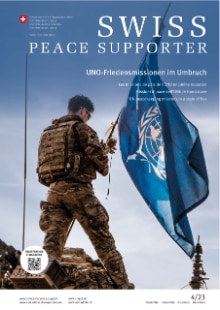- Home
- FDFA
- Publications
- All publications
Search and filter
Publications: 36
-

Swiss Peace Supporter 4/23
UN peacekeeping missions are confronted with numerous challenges, necessitating a reassessment of the UN's approach to peacekeeping. This process, however, also presents opportunities. Furthermore, a Swiss judge at the Special Criminal Court in the Central African Republic speaks about the effectiveness of this newly established tribunal in combating impunity. Finally, an expert in Addis Ababa shares insights on the advancement of women's rights in Africa.
-

Swiss Peace Supporter 3/23
"Paz Total" - this is the motto of the Colombian peace process, Switzerland's engagement there and this SPS. A special contribution by the organisation Justice Rapid Response shows how accountability for serious human rights violations can be strengthened. A Swiss expert looks back on his assignment as a tripple nexus advisor to the UN in South Sudan.
-

Swiss Peace Supporter 2/23
To mark the 500th SWISSCOY convoy, this edition focuses on the logistical challenges involved in military peace support. It includes an FDFA special looking behind the scenes at Nigeria's presidential elections and reports from two specialists in their field – one on the work of the UN in Burkina Faso and another on her role at Frontex's Fundamental Rights Office in Warsaw.
-

Swiss Peace Supporter 1/23
This edition focuses on the Demilitarised Zone between North and South Korea, which marks its 70th anniversary this year: we look back at the establishment of the Neutral Nations Supervisory Commission and report on an exhibition on Korea in Basel. Also in this edition, a Swiss protection officer reports on his deployment in Ukraine. Finally, a UN Women Sudan staff member looks back on a year filled with valuable lessons.
-

Swiss Peace Supporter 4/2022
Global peace is increasingly threatened by environmental risks. This edition of SPS is therefore focusing on options for action identified from SIPRI's Environment of Peace report, two experts reporting on women in water diplomacy in Central Asia, and climate induced migration in East Africa. You can also find out more about the UN's day-to-day work in Iraq.
-

Swiss Peace Supporter 3/2022
In the third issue, various Swiss experts share their knowledge of humanitarian demining. The article on the work of the Right to Information Commission in Sri Lanka in light of its current crisis and the review of the Human Security Adviser's work in Colombia since 2017 are also worth reading.
-

Swiss Peace Supporter 2/2022
This issue focuses on the Middle East. We bring you coverage of the first Swiss national to be appointed head of the UNTSO peacekeeping mission, and discuss Switzerland's engagement in Syria and Lebanon. You can also read reports on the evacuation from Kyiv and on the CIVPOL mission in Mali, as well as a special article on the importance of justice and law enforcement in peace support.
-

Swiss Peace Supporter 1/2022
This issue highlights the 'return on investment' of peace operations, i.e. their personal and institutional added value. An assignment at the UN in New York, for example, gave a colleague important impulses for his work in Sri Lanka. Other topics include the conflict in Cameroon in the context of the Africa Cup, a Moscow exhibition on gulags, and a look back at a long FDFA career in peacebuilding.
-

Swiss Peace Supporter 4/2021
The last issue of the Swiss Peace Supporter in 2021 focuses on the Western Balkans, where the largest Swiss military contingents are deployed. Switzerland's civilian peace support comprises inclusive dialogue platforms (p. 10) and support for the Kosovo Specialist Chambers (p. 18). Don't miss our articles on the UN's fight against human trafficking and on disaster-induced migration in East Africa.
-

Swiss Peace Supporter 3/2021
By combining conflict management and the promotion of democracy, Switzerland believes it can be an agent for change. For example, it aims to reinforce democratic processes by promoting free and fair elections and supporting freedom of expression in the digital space. The reports from eastern Ukraine, Kashmir and the UN headquarters in New York (on children and armed conflict) are also well worth a read.
-

Swiss Peace Supporter 2/2021
The SPS 2/2021 is devoted to the further development of military peace support and how the latter is adapting to future requirements. It also discusses the efforts to integrate women into the militia army after their deployment abroad. This edition’s Special also looks at promoting human rights standards for private security companies. Finally, a colleague reports on his daily life in Myanmar.
-

Swiss Peace Supporter 1/2021
The disarmament, demobilization and reintegration (DDR) of former combatants after armed conflicts is an essential part of the peace process. In this issue of SPS, Swiss experts share their experiences of DDR in Colombia, Mozambique and the Democratic Republic of the Congo. See also the special report on police missions.
Last update 26.01.2022
